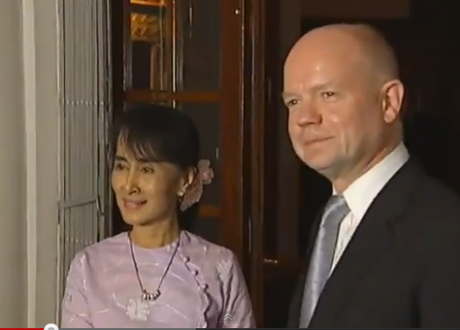
Aung San Suu Kyi, the pro-democracy leader in Burma, and British Foreign Secretary William Hague. Photocredit: http://www.youtube.com/watch?v=dVlVGG12OiU
William Hague, the British Foreign Secretary, has visited Nay Pyi Taw, the capital of Burma, and Rangoon, where he met the pro-democracy leader (and Nobel peace-prize winner) Aung San Suu Kyi – the first visit by a British foreign secretary there for over 50 years. Many international diplomats and officials have been visiting the country recently – Hillary Clinton, the US secretary of state, went there last month. Aung San Suu Kyi’s National League for Democracy (NLD) will be able to take part in parliamentary by-elections for 48 seats on April 1st, having boycotted elections in 2010 as Suu Kyi was not allowed to run.
Burma is moving towards reform, reported the BBC; it held its first polls for 20 years in November 2010. There’s now a “nominally civilian” government, under Thein Sein, though it’s backed by the military, which replaces the dictatorial military rule of senior general Than Shwe, who headed the junta. The latter has been keeping quiet, but continues to exert influence. Media censorship has been relaxed, and other reforms are being carried out; 200 political prisoners have been released. The consensus is that whilst the moves are seemingly a step in the right direction, there are still questions to be asked about the involvement of the military; and, too, about the direction of the country’s economy – who will benefit?
“[I]n order to realize our dreams we have to work very hard indeed,” said Aung San Suu Kyi, after meeting Hague, quoted in The Guardian.
“It is not possible to say a country is free and democratic while people are still in prison on the grounds of their political beliefs. It is vital that they be released if [sanctions] are to be removed,” Hague quoted on The Guardian.
But more needs to be done. Jason Burke in The Guardian quoted William Hague, who said that Burma must increase reforms before the EU lifts sanctions. Hague has also demanded that political prisoners be released, and that whilst there is “ ‘momentum for change’”, there still needs to be more pressure put on authorities. And what’s going on is still murky: the motivation, said Burke, of Than Shwe in distancing himself from power “is still unclear.” Burke suggested that the former military men will now be able to gain enormous wealth from the reform of what is now among the poorest countries in the world. Wishing to dilute Chinese influence may be another factor.
A capitulation of the NLD? Grant Peck on The First Post pointed out that Aung San Suu Kyi has warned that deomcratic reform is not “ ‘unstoppable’”, and that the military needs to accept changes. Some critics say that the decision of the NLD to return to electoral political is a “capitulation”, helping the government to “maintain a veneer of legitimacy” whilst it remains dominated by the army.
“The simmering discontent is there. When Daw (Madam) Aung San Suu Kyi goes into parliament . . . the world will think that there’s democracy in Burma, but inside the repression is still going on; there is fighting in the ethnic areas and people are still very poor. The hardliners will consolidate and think that they have it easy now (from the international community). It’s a very dangerous thing,” said Win Tin, a founder of Suu Kyi’s National League for Democracy, quoted on The Australian.
Ethnic problems. What’s most important, Peck continued, quoting Suu Kyi, is to stabilise the country’s ethnic troubles, which have been struggling for decades.
Where now for the economy? Burma’s seen hordes of VIPs in the past few months, said Simon Montlake on Forbes. Fund manager George Soros has been there too. International investors are taking a keen interest: Standard Chartered Banks is nosing in; whilst a deep-seap port may be taking off. Burma’s economy is now all down to its “dominant business families – the One Percent” – who must now become a “force for broader economic growth.” Some might say that they should get out of the way and “allow real entrepeneurs to take up the reins” – since all the “old cronies” did was suck up to the generals. But you still need the One Percent, as they have access to many things that the government won’t provide. In any case, the business men must remember, as those in Wall Street are now realising, that actions take place in a social context.
William Hague meets Aung Sann Suu Kyi
More on Burma
- Hillary Clinton visits Burma
- Aung San Suu Kyi delivers Reith lecture

